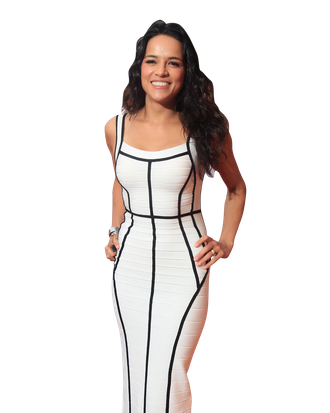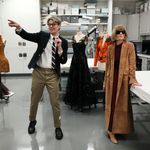
With a franchise as long-running as The Fast and the Furious, it’s not unusual to see characters come and go from film to film — unless they’ve been killed off. Michelle Rodriguez’s character, Letty Ortiz, seemingly perished at the end of the series’ fourth installment, but that didn’t stop the Fast & Furious 6 team from bringing her back from beyond the veil. Vulture recently got on the phone with the actress, who’s also appeared in Avatar and on Lost, to talk about what it’s like to be resurrected, why she won’t sing karaoke with Vin Diesel, and the women of the franchise.
When you first took on the role of Letty, did you imagine the series turning into something so huge?
Hell, no. Are you kidding me? First one, I just couldn’t believe there was going to be a movie that had this kind of stuff happening. You just never saw that world — multicultural cast, underground racing. I knew it really well in New York. I was just itching to be a part of it. It’s like being part of one of those little rebellious creatures that snowballs into a massive thing. It’s an audience-member phenomenon because they’re the ones that perpetuate more of these movies being made. It’s not the critics. Critics in Hollywood laugh at the franchise. For them, it’s not deep. But I think as long as the people love it, it’ll keep itself alive. I love being part of it; I don’t care what anyone says.
What’s it like being a character who’s been brought back from the dead?
[Laughs] Well, there’s two things that happen. First you feel this love, this warm, fuzzy feeling in your chest, where you’re like, “Wow, all that hard work I put into making Letty a respectable character, that work was appreciated. Then there’s the second part that happens, and that’s that sense of responsibility and massive amount of pressure. “All right, they brought you back, now prove you’re worth it.” It was a mixture of emotions that I went through when I found out that the people wanted me back and that the studio was receptive to that.
When your character was originally “died,” did you think that would be the end of your association with the franchise?
I was in New Zealand, shooting [Avatar], which was going to relaunch a career that had died out for about two years. I begged them to leave open the possibility of me coming back … That was the happy median where we left off. I kind of expected it to be one of the situations where I was duped. Then Vin did his petition, and the audience did theirs, and the studio turned their head around, and here we have it: 6.
What do you think it is about Letty that people are drawn to?
They definitely wouldn’t have related to what was on paper for the first one. That character was something else. Originally this girl was a slut. Girls don’t respect girls that are this way, and guys don’t respect girls that are this way. They want to bang them, or they make a good one-night stand, but no man respects a floozy. If you’re an individual within this franchise, the third lead, or the fourth lead, nobody’s going to be paying attention to your story but you. Because you know what, the writers and producers are a little bit busy coming up with all the action and the last thing on their mind is the integrity of the individual character’s story lines. So it’s the people who actually fight for their characters who win in the end.
That brings up an interesting point: Most of the female characters in this series are a bit … lacking when they’re first introduced.
Oh my god, I was crying on the set. I was like, “Look, dude, I love you guys, I really want to be a part of this, but I can’t play a slut in front of millions of people around the world.” I’d rather go back to Jersey City, doing my small little indie movies. It’s not until now, post–Angelina Jolie, doing her thing as a woman who can actually bring box office, that you can make money with a woman who’s respectable and kicking ass in a movie. It changes the game for writers. Before there was no incentive for them to take the girl out of being captured or being the girlfriend. That tone was something that was set in the first one by me fighting Rob Cohen, to punch somebody and knock him out. I knew, in the streets, if your tribe was getting in a fight, it doesn’t matter if you’re a girl or a boy, you’re throwing a punch because that’s just the way the streets work.
How has it been watching the female characters evolve over the course of the franchise?
If I ever hear anything demeaning about a chick who’s a part of the family, I stand up and defend. And everyone knows it. I’m really about that girl power, you know, not just about me, but just about anyone who’s in the game repping what we’re repping. You need to bring it. And if you’re a girl who’s not bringing it, it’s kind of pointless to me.
What’s it been like working with so many of the same people on these films?
The only thing I can compare it to is working on a long-lasting television show. Where you grow up with these people. I was 21 years old and was launched into Hollywood with the first one. I’m 34 now. It’s surreal. I’ve watched all these guys grow, watch them go from studs out there doing their thing and partying to having families, settling down. It’s a beautiful thing to have relationships like that in Hollywood where you’re still working together, thirteen to fourteen years later.
Are you close with any of the other actors?
Yeah, I love me some Vin and Paul. They’re frickin’ awesome dudes.
What’d you think of the video of Vin’s karaoke?
[Laughs] Yeah! Dude, isn’t it insane? And you look at the reception it got, and I’m like, “Wow, you really do have fans!”
Have you ever sang karaoke for Vin?
Not for Facebook. I’m too shy for that kind of stuff.




